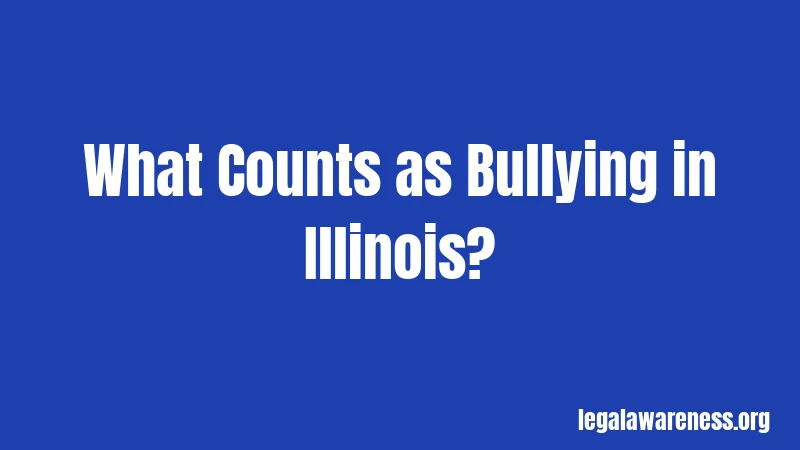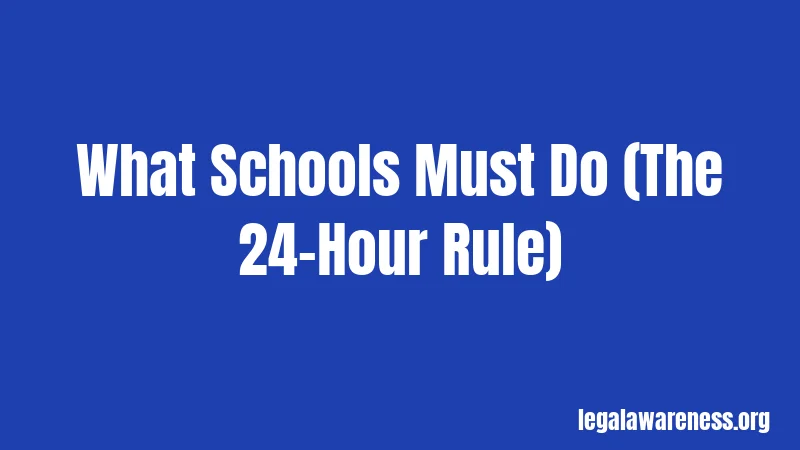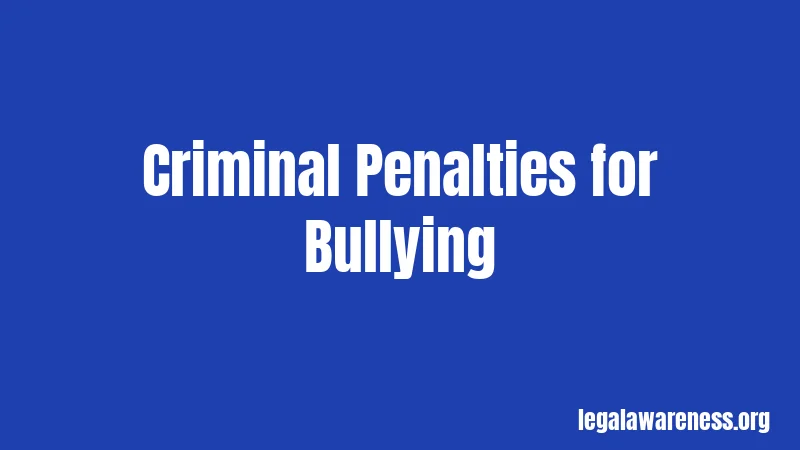Bullying Laws in Illinois (2026): Schools Must Act Fast
Most people think bullying is just kids being mean. It’s way more than that in Illinois. The state has strict laws that protect students from all kinds of harassment. And honestly, the penalties can be serious.
Let me break down exactly what you need to know about Illinois bullying laws. Whether you’re a parent, student, or teacher, these rules matter.
What Counts as Bullying in Illinois?

Illinois defines bullying as any severe or repeated physical or verbal act toward a student. This includes stuff done in person, online, or through any electronic device.
The behavior has to do one of these things. It puts the student in fear of harm. It causes serious harm to their mental or physical health. It messes with their ability to do well in school. Or it stops them from participating in school activities.
Sound complicated? It’s actually pretty straightforward.
Bullying can look like a lot of different things. Harassment, threats, intimidation, stalking, physical violence, sexual harassment or violence, theft, public humiliation, destroying property, or payback for reporting bullying. The list goes on.
Wondering if cyberbullying counts? Yep, totally. Using technology to bully someone is just as illegal as doing it face-to-face. Think texts, social media posts, emails, instant messages, or creating fake profiles pretending to be someone else.
Who’s Protected Under Illinois Law?
Illinois doesn’t mess around with this part. The law protects students from bullying based on actual or perceived characteristics.
Race, color, religion, sex, national origin, ancestry, age, marital status, physical or mental disability, military status, sexual orientation, and any other distinguishing trait. All protected.
Here’s where it gets interesting. In 2023, Illinois expanded the list even more. Now it specifically includes physical appearance, socioeconomic status, academic status, pregnancy, parenting status, and homelessness.
Most people don’t realize how broad these protections are. You’re not alone if this surprises you.
What Schools Must Do (The 24-Hour Rule)

Okay, this one’s important. Schools have to follow some pretty specific rules when bullying happens.
First, every school must have an anti-bullying policy. Not just any policy either. It has to be filed with the Illinois State Board of Education. Schools have to share this policy with students and parents every single year.
But wait, there’s more. The big change that took effect in the 2024-2025 school year is the 24-hour notification rule. Schools must tell parents within 24 hours after learning about any bullying incident involving their child.
That’s right. Twenty-four hours. Not “whenever we get around to it.” Not “at the next parent-teacher conference.” Within one day.
This applies whether your child is the one being bullied or the one doing the bullying. Schools have to make serious efforts to reach you using every contact method they have on file.
Hold on, this part is super important. When bullying involves threats of self-harm or actual self-harm, schools have extra notification requirements. They need to follow special guidelines to make sure parents know what’s happening right away.
Where Illinois Bullying Laws Apply
Not sure if something counts because it happened outside school? Let me explain.
Illinois bullying laws cover bullying that happens during any school activity or program. On school grounds, obviously. But also at school-sponsored events, on school buses, or through school computers and networks.
Here’s what surprises most people. The law also covers bullying that happens off campus in certain situations. If a student uses their own phone or computer at home to bully another student, and it causes a major disruption at school, the school still has to act.
The key phrase is “substantial disruption to the educational process.” Basically, if the bullying affects what happens at school, it falls under these laws even if it started on someone’s personal device at home.
Criminal Penalties for Bullying

Now, here’s where things get serious. Some bullying can lead to actual criminal charges. We’re talking misdemeanors or even felonies.
Harassment Charges
If someone uses electronic communication to harass another person, they can face criminal charges. This means knowingly doing things that cause emotional distress to someone else.
A first offense is a Class B misdemeanor. You could face up to six months in jail. A second offense jumps to a Class A misdemeanor with up to one year behind bars.
But it gets worse. If the victim is under 13 and the person doing the harassing is 16 or older, it becomes a Class 4 felony. That’s one to three years in prison and fines up to $25,000.
Pretty straightforward penalties that escalate fast.
Cyberstalking
Cyberstalking is more serious than harassment. It means using electronic communication to threaten someone or make them fear for their safety. You have to do this at least twice for it to count as stalking.
A first cyberstalking offense is a Class 4 felony. One to three years in prison and up to $25,000 in fines. Subsequent convictions are Class 3 felonies with two to five years in prison.
Here’s the kicker. If the cyberstalking is motivated by the victim’s race, religion, gender, sexual orientation, disability, immigration status, or national origin, it’s a hate crime. The penalties get even stiffer.
Hate crime cyberstalking near a school can be a Class 3 felony on the first offense. Repeat offenses are Class 2 felonies with three to seven years in prison.
What About Kids?
Teens under 18 usually go through the juvenile court system. The process works differently than adult court.
Juveniles might get what’s called “adjustment” or “diversion.” These options keep kids out of formal court proceedings. But they come with strict rules the juvenile has to follow.
If the case goes to juvenile court, there’s an adjudication hearing instead of a trial. The focus is more on rehabilitation than punishment. That said, serious cases can still result in detention or other consequences.
School Consequences and Interventions
Criminal charges aren’t the only thing bullies face. Schools have their own discipline systems too.
Schools can use interventions like social work services, restorative measures, social-emotional skill building, counseling, school psychological services, and community-based services. The goal is to stop the bullying and help everyone involved.
Consequences depend on how serious the bullying is. Minor incidents might result in detention or suspension. Severe or repeated bullying can lead to expulsion.
Honestly, this is probably the most important part for most families. Schools have to investigate every report and take appropriate action.
Reporting Requirements for Schools
Starting with the 2024-2025 school year, schools have new data collection requirements. They must track every verified allegation of bullying.
This information gets submitted to the Illinois State Board of Education by August 15 each year. The reports run through the 2030-2031 school year.
Schools have to record what action they took. They also note whether the bullying was based on protected characteristics like race, religion, disability, or any of the other categories we talked about earlier.
All of this data is non-identifiable to protect student privacy. But it helps the state understand how much bullying is happening and where.
How to Report Bullying
You’re not alone if you’re wondering how to actually report bullying. Here’s what to do.
Every school must have a designated person who receives bullying reports. This information should be in the student handbook and posted on the school’s website.
Students, parents, or anyone else can report bullying. You can do it in writing or verbally. Most schools also have a way to report anonymously.
Once someone reports bullying, the school has to investigate promptly. Generally within 10 days. Complaints involving violence should be investigated immediately.
Don’t worry, we’ll break it down step by step. First, gather any evidence you have. Screenshots, text messages, witness statements, or anything that shows what happened.
Next, contact the school’s designated bullying coordinator. If you’re not comfortable with that person, talk to a principal, counselor, or superintendent.
Document everything. Keep records of when you reported it, who you talked to, and what they said they’d do.
If the school doesn’t respond appropriately, you have other options. You can file a complaint with the Illinois State Board of Education. You can also contact the Office of Civil Rights at the U.S. Department of Education.
Special Protections and Resources
Illinois offers some helpful resources beyond just the laws themselves. Let me tell you about a few.
Safe2Help Illinois is a 24/7 program where students can report school safety issues confidentially. You can use a free app, text, phone, website, or social media. The tips get shared with school officials, mental health professionals, or law enforcement depending on what’s needed.
The goal isn’t to punish students. It’s to “Seek Help Before Harm.” Pretty smart approach, right?
Schools must also provide victims with information about available services. This includes counseling, support services, and other programs both in the district and the community.
When bullying is based on bias or discrimination, it might also violate federal civil rights laws. Schools that get federal funding have to address discrimination based on certain characteristics.
What Parents Can Do
Okay, pause. Read this carefully. If your child is being bullied, you have several options.
Start by following the school’s reporting procedures. Document everything that happens. Keep a record of the bullying incidents, when you reported them, and what the school did.
If the school doesn’t take appropriate action, consider filing a formal complaint. You can go to the school board, the Illinois State Board of Education, or federal agencies.
In extreme cases, some parents seek an order of protection (restraining order) against the bully. This is a serious legal step that bars contact between the two students. The bully couldn’t be near your child, talk to them, send messages, or even ask others to pass along comments.
Filing an order of protection against a minor is no joke. The other child’s parents will almost certainly contest it in court. But when school interventions fail and the situation is dire, it might be necessary.
Most people assume this is a last resort. They’re right.
You might also consider talking to an attorney who handles education law or family law. Sometimes having a lawyer contact the bully’s parents directly gets faster results than going through official channels.
Here’s something else many parents don’t know. Parents can sometimes be held liable for their children’s bullying actions. That legal pressure can motivate families to take the problem seriously.
Consequences for False Reports
Wait, it gets better. Illinois law also addresses false accusations of bullying.
If someone falsely accuses another person of bullying as retaliation or as a form of bullying itself, there are consequences. School policies must include appropriate remedial actions for false reports.
This protects students from being wrongly targeted. Making false accusations is taken seriously because it undermines the whole system.
That said, schools can’t punish someone solely based on an anonymous report. There has to be an investigation and evidence.
The Role of School Staff
School employees have specific responsibilities when it comes to bullying. Let me break it down.
All school staff must report any bullying they witness or become aware of. This includes teachers, administrators, school nurses, food service workers, bus drivers, coaches, and anyone else who works for the school.
They have to report it by the end of their regular work day. Failure to report can result in disciplinary action against the staff member.
Schools are supposed to provide information to staff about the anti-bullying policy. But here’s something that might surprise you. Illinois law doesn’t actually require schools to train teachers and staff on how to respond to bullying incidents.
Many schools do provide training anyway. But it’s not legally required. Kind of odd, honestly.
Current Status and Recent Changes
The most recent major updates to Illinois bullying laws happened in 2023. Governor Pritzker signed House Bill 3425 into law, which took effect for the 2024-2025 school year.
The key changes included the 24-hour parent notification requirement we talked about. Plus the expanded list of protected characteristics. And the new data collection and reporting requirements for schools.
These changes make Illinois one of the stricter states when it comes to anti-bullying laws. The goal is to shine a light on bullying incidents and make sure they’re addressed quickly.
Some experts think the 24-hour rule is a game-changer. Others worry it might overwhelm schools with reporting requirements. Time will tell how effective these changes are.
What If Bullying Continues?
Not sure what to do if the bullying doesn’t stop? You have options.
First, document that the bullying is continuing. Keep records showing that you reported it, what the school did, and evidence that the problem persists.
Follow up with the school in writing. Email works great because it creates a paper trail. Ask specifically what steps they’re taking and when you can expect to see results.
If necessary, go higher up the chain. Start with the principal, then the superintendent, then the school board. Each level should take the matter more seriously.
You can also file complaints with outside agencies. The Illinois State Board of Education handles complaints about whether schools are following the law. The Office of Civil Rights handles cases where bullying might be discrimination.
In serious situations, consult with an attorney. They can explain your legal options and help you navigate the system.
Trust me, this works. Persistence often gets results when initial reports don’t.
Understanding Your Rights
You’re not alone, this confuses a lot of people. Let me make it simple.
Students have the right to attend school free from bullying. Parents have the right to be informed when their child is involved in a bullying incident. And everyone has the right to report bullying without retaliation.
Schools must investigate reports and take appropriate action. They can’t ignore bullying or sweep it under the rug. If they do, they’re violating state law.
The anti-bullying policy should be publicly available. You can find it on the school’s website or request a copy from the office. Read it so you know exactly what procedures the school is supposed to follow.
Knowledge is power. Understanding your rights makes it easier to advocate for your child.
Frequently Asked Questions
What should I do if my child is being bullied at school?
Report it to the school’s designated bullying coordinator immediately. Document everything that happened. The school must notify you within 24 hours and investigate the incident. Keep records of all communications with the school.
Can my child be charged with a crime for cyberbullying?
Yes, cyberbullying can result in criminal charges ranging from misdemeanors to felonies depending on the severity. First-time harassment is a Class B misdemeanor with up to six months in jail. More serious cases involving threats or young victims can be felonies with years in prison.
Does Illinois law cover bullying that happens outside of school?
Yes, if the off-campus bullying causes a substantial disruption to the educational process. This includes cyberbullying done on personal devices at home if it affects what happens at school.
How long does a school have to investigate a bullying report?
Schools should complete investigations as soon as practicable, generally within 10 days. Complaints involving violence must be investigated immediately. Parents must be notified within 24 hours of the school learning about the incident.
What if the school doesn’t take action after I report bullying?
You can file a complaint with the school board, Illinois State Board of Education, or the U.S. Department of Education’s Office of Civil Rights. You may also want to consult with an attorney about your options, including seeking an order of protection in severe cases.
Are there protections against retaliation for reporting bullying?
Yes, Illinois law specifically prohibits retaliation against anyone who reports bullying. School policies must include consequences for people who retaliate. If you face retaliation, report that too.
Can parents be held responsible for their child’s bullying behavior?
Yes, in some cases parents can be held liable for their children’s bullying actions. This can provide additional motivation for families to address the problem seriously.
What’s the difference between bullying and harassment under Illinois law?
Bullying is the broader term used in school policies and includes various behaviors. Harassment is a specific criminal offense that involves conduct causing emotional distress. Bullying can potentially lead to harassment charges depending on the circumstances.
Final Thoughts
Now you know the basics of Illinois bullying laws. The state takes this issue seriously, and the penalties reflect that.
Schools must act fast. Parents must be informed. And everyone has a role in creating safe learning environments.
If you or your child is dealing with bullying, don’t wait. Report it immediately and follow through. The law is on your side.
Stay informed, stay safe, and when in doubt, document everything and ask for help.
References
- Illinois School Code – Bullying Prevention (105 ILCS 5/27-23.7)
- Illinois State Board of Education – Bullying Prevention
- Illinois Anti-Bullying Laws & Policies – StopBullying.gov
- Public Act 103-0047 – Illinois General Assembly
- Illinois Cyberbullying and Harassment Laws – Criminal Defense Lawyer
- Safe2Help Illinois
- Illinois Legal Aid Online – Preventing Bullying at School
